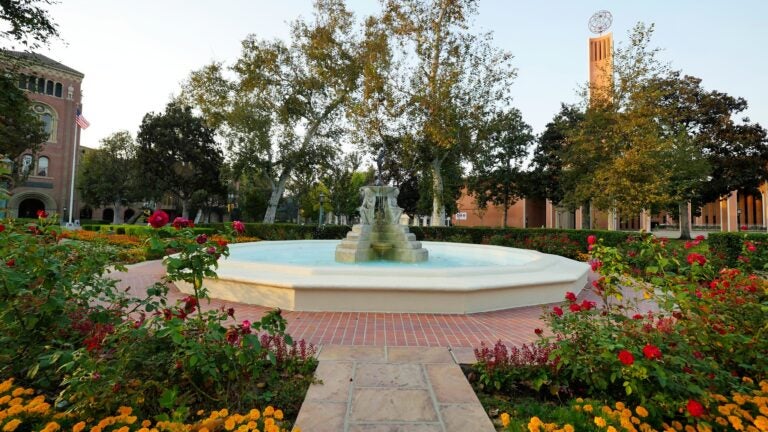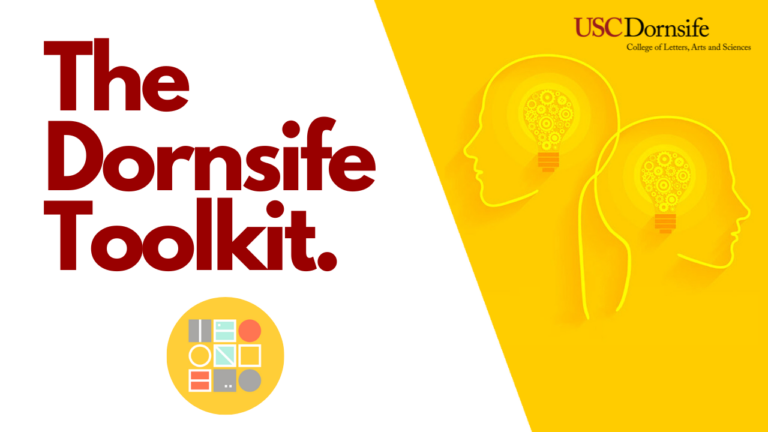The Dornsife Toolkit is a signature collection of classes teaching intellectual skills that are typically acquired only through work and life experience: becoming a dynamic communicator, writing grants, managing your personal finances, taking an entrepreneurial leap, and more.
These are practical skills, but much more than that, they’re the skills leaders draw on to create opportunities for their talents and ideas. These two-unit courses provide the intellectual skills desired by employers and valued by graduate and professional programs.
Toolkit courses are listed in the Schedule of Classes and Web Registration under MDA 300x.
Topics Offered
-
James Bottom
This course will give you insights into how venture capitalists evaluate prospective deals. While most classes at USC provide a curriculum on how to be a founder or start a company, this course will view the startup world from an investor’s perspective. We will look at how to evaluate if a venture is working on a repeatable business model and how to evaluate the revenue models they are proposing. We will also discuss different ways ventures can finance early-stage growth because raising venture capital is not for everyone.
James Bottom is the former Project Director of Blackstone LaunchPad USC. He holds a Bachelor of Arts in International Relations, was a Team Captain of the National Champion Rose Bowl Team in 2003, and has an MBA from the Marshall School of Business. James’ expertise is in startups, incubators, mentors, crowd funding and crowd sourcing.
-
Helaine Owen Lopes
Medical doctors provide only a part of contemporary health care. This course focuses on opportunities in the health care field beyond the role played by physicians, providing information to those that are interested in health care but who may be unsure of the options they have and the requirements to fulfill those options. Professions include physician’s assistant, nurse, orthotist, physical therapist, nutritionist, and athletic trainer, among others. The Career Center offers some information about these professions, but this course provides a much more extensive, detailed introduction to each potential career choice, sometimes from practitioners in those fields.
Helaine Owen Lopes has worked for 40 years at USC as an Athletic Trainer and a lecturer in the Human and Evolutionary Biology division of the Biological Sciences department. She teaches courses in the prevention, care, evaluation and rehabilitation of athletic injuries, in skeletal muscle physiology and nutrition labs.
-
Kambiz “Kamy” Akhavan
This course will lead students through the process of setting up a nonprofit for long-term success. We will learn about the pros and cons of various nonprofit structures, building your board, making a pitch, marketing, partnerships, grant writing, measuring impact, fundraising beyond grants, and the nonprofit industry in general. Doing Good features many prominent guest speakers.
Kambiz “Kamy” Akhavan ran two national nonprofit organizations, works on several nonprofit boards, and currently serves as the Executive Director of the USC Dornsife Center for the Political Future.
-
Amanda Hobmeier
Grant writers are always in demand. They work in nonprofit organizations, research institutions, and companies that have federally funded projects. Scientists write grants to fund their research; nonprofits seek grants to fund their projects. Many grant writers hold freelance careers as consultants as well. Their specific technical and persuasive writing skills allow them to submit successful proposals. This course will teach you how to do that through structured workshops that help you identify goals and move projects toward funding.
Professor Hobmeier received her Ph.D. in English from The University of Washington and currently is an Assistant Professor in The Writing Program. Her areas of emphases include business and professional writing as well as interdisciplinary and cross-cultural contexts. She has been funded in numerous ways, and supports students in their pursuits through mentoring and the teaching of writing.
-
Sneha Mathur
This class will help students understand how the construction of difference affects the experience of “dominant” and “minority” group members, including how student’s own identity has been shaped by these experiences. Students will engage in readings, experiences, self-reflections, and discussions, which will increase their awareness as “global citizens,” a process with the potential to challenge and expand their intellectual comfort zones. Students will examine how prejudice and discrimination are related and how to recognize and confront these processes (in ourselves and in others). Students will explore the origins, persistence and impact of stereotypes. The ultimate aim of the course is to enable students to gain a greater appreciation for diversity and commit to continued growth and learning, and understand how to bridge differences in order to create a more socially just society. Specific skills that will be taught include:
- Learning about the different types of diversities – cultivating cultural awareness and belonging
- Identifying and confronting your own implicit and explicit biases
- Understanding where stereotypes come from and how to address these
- Learning about microaggressions and how they may manifest in the workplace – how to identify your own as well as when you are the recipient of microaggressions
- Develop advocacy skills for yourself and to be an ally and advocate within the workplace
- How to engage in active listening
- How to be an authentic employee while creating an inclusive workplace
-
Andrzej Rutkowski
This course introduces students to data visualization with a focus on Los Angeles. Working closely with a selection of important historical and contemporary visualizations, students will develop skills for understanding, interpreting, and creating visualizations with current data. Students will be introduced to a variety of software, tools, and methods as well as artistic/hands-on practices such as, cognitive mapping, physical data visualization, artist books, and zines.
Andrzej Rutkowski is the Visualization Specialist at USC Libraries.
-
Karen Ruiz
There has been an increased demand for people with American Sign Language skills in recent years. This Dornsife Toolkit will introduce students to the structure and vocabulary of American Sign Language. It will emphasize the use of receptive and expressive skills, including facial expressions and fingerspelling, and prepare for visual and gestural communication. By the end of the course, students will have a better understanding of the deaf and hard of hearing community and acquired essential communication skills.
Karen Ruiz is a Lecturer in the Linguistics department. She has worked with deaf autistic teens and taught ASL at East Los Angeles College. She holds a master’s degree in sign language education from Gallaudet University, the only university for the deaf and hard of hearing in the world. Karen is currently working with families with infants and toddlers who are deaf or hard of hearing.
-
James Bottom
This class provides an introduction to startup culture and an overview of the skills necessary to be successful in building a startup idea for a business or NGO. The goal is for students to prototype an idea from conception through the alpha testing stage in a single semester.
James Bottom is the former Project Director of Blackstone LaunchPad USC. He holds a Bachelor of Arts in International Relations, was a Team Captain of the National Champion Rose Bowl Team in 2003, and has an MBA from the Marshall School of Business. James’ expertise is in startups, incubators, mentors, crowd funding and crowd sourcing.
-
Stephanie Eggert
In a world undergoing the quantum effects of information overload, this class provides an environment for students to increase their personal vitality. Activating the resources to balance ourselves neurologically and emotionally, students will gain energy and learn to balance life with work, improving their ability to maneuver successfully through the college experience and beyond for optimum personal success.
Stephanie Eggert is a Senior Lecturer in Physical Education. She teaches Stress Management for Healthy Living, Kundalini Yoga and Meditation, Humanology, and Principles of Athletic Coaching.
-
Molly Lancaster
This course will introduce students to the impact of culture and diversity on wellness. Students will expand their knowledge and appreciation of social determinants of health. The course will focus on self-examination, discussion, case studies and social analysis allowing students to develop cultural competency with a focus on health and medicine. Ultimately, students will come away with a broader understanding of diversity and differing perspectives and the unique needs of multicultural populations. This knowledge will prepare students to engage in effective, culturally congruent, and positive interpersonal communications.
Dr. Lancaster completed her Ph.D. in Preventive Medicine at Keck School of Medicine of USC and has an interdisciplinary background in community health, translational science, biomedical investigations, mindfulness, and psychology, with an emphasis on innovation in medicine and multicultural health education. She’s the Executive Director of Pre-Health Advising at USC Dornsife.
-
Lodovico Pizzati
This course combines economic and financial concepts to help students navigate the complexities of the economic system and make informed financial decisions. Students will become acquainted with the insights of saving, investing, and personal economics through lectures and in-class exercises that apply the knowledge learned to a practical situation.
Professor Pizzati will combine his professional experience in consulting with life experiences as an economist making personal financial decisions to provide the students with a dynamic learning experience.
Contact Us
Dornsife Undergraduate Programs
undergraduateprograms@dornsife.usc.edu
213.740.2961

